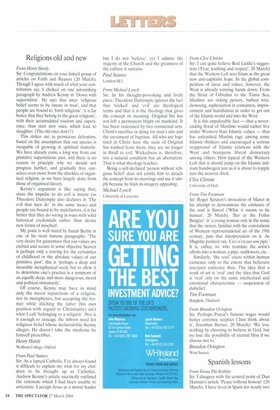Religions old and new
From Henry Hardy Sir: Congratulations on your linked group of articles on Faith and Reason (20 March). Though I agree with much of what your contributors say, I choked on one astonishing paragraph by Andrew Kenny in 'Down with superstition'. He says that since 'religious belief seems to be innate in man', and that people are bound to 'form religions', 'it is far better that they belong to the great religions', with their accumulated wisdom and experience, than start new ones, which lead to slaughter. (The old ones don't?) This strikes me as pernicious defeatism, based on the assumption that our species is incapable of growing in spiritual maturity. We have already come a long way from our primitive superstitious past, and there is no reason in principle why we should not progress further, and gradually free ourselves even more from the shackles of organised religion, as we have largely done from those of organised slavery.
Kenny's argument is like saying that, since the impulse to do evil is innate (as Theodore Dalrymple also declares in 'The evil that men do' in the same issue) and people are bound to be malefactors, it is far better that they do wrong in ways with solid historical credentials rather than devise new forms of mischief.
My point is well stated by Isaiah Berlin in one of his most famous paragraphs: 'The very desire for guarantees that our values are eternal and secure in some objective heaven is perhaps only a craving for the certainties of childhood or the absolute values of our primitive past'; this is 'perhaps a deep and incurable metaphysical need; but to allow it to determine one's practice is a symptom of an equally deep, and more dangerous, moral and political immaturity'.
Of course, Kenny may have in mind only the moral injunctions of a religion, not its metaphysics, but accepting the former while ditching the latter (his own position with regard to Christianity) isn't what I call 'belonging to a religion'. Nor is it enough to assuage the inborn need for religious belief whose ineluctability Kenny alleges. He doesn't take the medicine he himself prescribes.
Henry Hardy
Wolfson College, Oxford


























































































 Previous page
Previous page